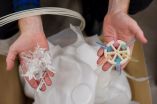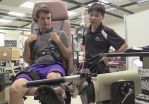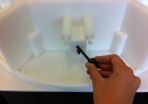Intervention helps decrease 'mean girl' behaviors, MU researchers find
Combination of group counseling, caregiver training reduces relational aggression in teen girls
2014-10-01
(Press-News.org) COLUMBIA, Mo. – Relational aggression, or "mean girl" bullying, is a popular subject in news and entertainment media. This nonphysical form of aggression generally used among adolescent girls includes gossiping, rumor spreading, exclusion and rejection. As media coverage has illustrated, relational aggression can lead to tragic and sometimes fatal outcomes. Despite these alarming concerns, little has been done to prevent and eliminate these negative behaviors. Now, University of Missouri researchers have developed and tested an intervention that effectively decreases relational aggression among teen girls.
"Good outcomes can happen when priorities are set by schools and families to prevent and eliminate relational aggression," said co-author Connie Brooks, an assistant professor in the Department of Health Psychology in the School of Health Professions and in the Thompson Center for Autism and Neurodevelopmental Disorders. "This study was an attempt to address this social problem in a meaningful way by testing an intervention to reduce relational aggression among teen girls."
The intervention, Growing Interpersonal Relationships through Learning and Systemic Supports (GIRLSS), developed by MU researchers, is a 10-week, group counseling, caregiver training and caregiver phone consultation intervention for relationally aggressive middle school girls and their families. Students, ranging in age from 12 to 15, participated in one 70-minute session per week that included interactive discussions, media-based examples, role-playing, journaling and weekly goal setting. At the end of the intervention, school counselors and teachers reported a decrease in relationally aggressive behaviors among the girls.
Caregivers of students participated in separate workshops and biweekly phone consultations during which they learned new communication, monitoring and supervision strategies in addition to appropriate disciplinary responses.
"It takes a village to raise relationally healthy children," said Melissa Maras, co-author and assistant professor in the Department of Educational, School and Counseling Psychology in the MU College of Education. "This study represents a first step in helping school personnel meet the intervention needs of a diverse group of relationally aggressive girls."
According to Brooks, relational aggression is a complicated issue with many variables, including schools, families and individuals. She says parents and teachers should be aware of relational aggression so they don't unknowingly contribute to the negative behaviors.
In order for the intervention to expand to more schools, MU researchers hope to improve and further evaluate GRILSS based on feedback from the participants.
The study's lead author, Joni Williams Splett, completed this research at MU while she was a doctoral student. Splett is now a postdoctoral research fellow at the University of South Carolina. The research, "GIRLSS: A Randomized, Plot Study of a Multisystemic, School-Based Intervention to Reduce Relational Aggression," was published in the Journal of Child and Family Studies.
INFORMATION:
ELSE PRESS RELEASES FROM THIS DATE:
2014-10-01
This news release is available in French and Spanish. The Commission for Environmental Cooperation (CEC) has released a comprehensive report on the changing face of industrial pollution in North America, covering the years 2005 through 2010. This is the first time an edition of the CEC's Taking Stock series, which gathers data from pollutant release and transfer registers (PRTRs) in Canada, Mexico and the United States, has analyzed North American pollutant information over an extended timeframe. To view the report, visit http://www.cec.org/library.
This volume ...
2014-10-01
Biological sensors, or biosensors, are like technological canaries in the coalmine. By converting a biological response into an optical or electrical signal, they can alert us to dangers in our external and internal environments. They can sense toxic chemicals and particles in the air and enzymes, molecules, and antibodies in the body that could indicate diabetes, cancer, and other diseases.
An optical biosensor works by absorbing a specific bandwidth of light and shifting the spectrum when it senses minor changes in the environment. The narrower the band of absorbed ...
2014-10-01
It's old news that open-source 3D printing has a lot going for it: it's cheap, green and incredibly useful for making everything from lab equipment to chess pieces. Now it's time to add another star to the 3D printing constellation. It may help lift some of the world's most destitute people from poverty while cleaning up a major blight on the earth and its oceans: plastic trash.
At the center of the movement is a new set of standards inspired by fair trade products ranging from diamonds to chocolate.
"We are creating a new class of material called ethical 3D printing ...
2014-10-01
Washington, D.C., October 1, 2014—Use of specific dietary supplements can have a positive effect on health care costs through avoided hospitalizations related to Coronary Heart Disease (CHD), according to a new article published in the Journal of Dietary Supplements(1). The article, "From Science to Finance—A Tool for Deriving Economic Implications from the Results of Dietary Supplement Clinical Studies," published by Christopher Shanahan and Robert de Lorimier, Ph.D., explores a potential cost-benefit analysis tool that, when applied to a high-risk population (U.S. adults ...
2014-10-01
Reston, Va. (October 1, 2014) – Researchers at Memorial Sloan Kettering found that PET/CT imaging of patients younger than 40 who were initially diagnosed with stage I–III breast cancer resulted in change of diagnosis. As reported in the October issue of The Journal of Nuclear Medicine, while guidelines recommend FDG-PET/CT imaging only for women with stage III breast cancer, it can also help physicians more accurately diagnose young breast cancer patients initially diagnosed with earlier stages of the disease.
Assessing if and how far breast cancer has spread throughout ...
2014-10-01
As the threat of antibiotic resistance grows, scientists are turning to the human body and the trillion or so bacteria that have colonized us — collectively called our microbiota — for new clues to fighting microbial infections. They've logged an early success with the discovery of a new antibiotic candidate from vaginal bacteria, reports Chemical & Engineering News (C&EN), the weekly newsmagazine of the American Chemical Society.
Matt Davenport, a C&EN contributing editor, explains that the human microbiota produces thousands of small molecules. Some have been discovered ...
2014-10-01
Here's another reason why it's a good idea to hit the gym: it can improve memory. A new Georgia Institute of Technology study shows that an intense workout of as little as 20 minutes can enhance episodic memory, also known as long-term memory for previous events, by about 10 percent in healthy young adults (see a video demo).
The Georgia Tech research isn't the first to find that exercise can improve memory. But the study, which was just published in the journal Acta Psychologica, took a few new approaches. While many existing studies have demonstrated that months of ...
2014-10-01
Materials – Vehicle Lightweighting ...
For about the price of leather seats, automakers can trim approximately 362 pounds off the body and chassis of a midsize passenger vehicle, according to an Oak Ridge National Laboratory study. Researchers analyzed an array of materials – carbon fiber, advanced high-strength steel, aluminum alloys, magnesium alloys – that could replace steel. While the carbon fiber composite option reduced weight by 35 percent at an additional cost of $1,317, a combination of advanced high-strength steel and alloys resulted in a 25 percent weight ...
2014-10-01
Pity the poor lithium ion. Drawn relentlessly by its electrical charge, it surges from anode to cathode and back again, shouldering its way through an elaborate molecular obstacle course. This journey is essential to powering everything from cell phones to cordless power tools. Yet, no one really understands what goes on at the atomic scale as lithium ion batteries are used and recharged, over and over again.
Michigan Technological University researcher Reza Shahbazian-Yassar has made it his business to better map the ion's long, strange trip—and perhaps make it smoother ...
2014-10-01
People who are unable to button up their jacket or who find it difficult to insert a key in lock suffer from a condition known as apraxia. This means that their motor skills have been impaired – as a result of a stroke, for instance. Scientists in Munich have now examined the parts of the brain that are responsible for planning and executing complex actions. They discovered that there is a specific network in the brain for using tools. Their findings have been published in the Journal of Neuroscience.
Researchers from Technische Universität München (TUM) and the Klinikum ...
LAST 30 PRESS RELEASES:
[Press-News.org] Intervention helps decrease 'mean girl' behaviors, MU researchers find
Combination of group counseling, caregiver training reduces relational aggression in teen girls



